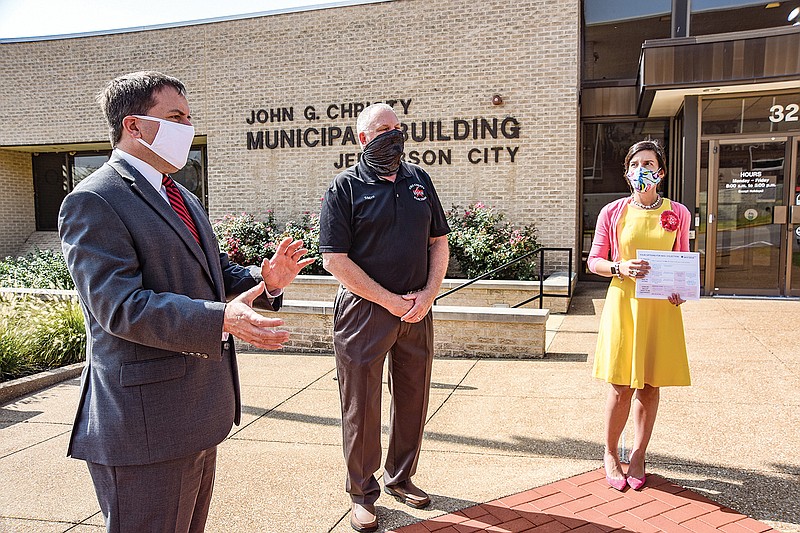Missouri Secretary of State Jay Ashcroft on Monday began a four-day trip through the state in Jefferson City to promote in-person voting and share information about absentee and mail-in ballot options created by state lawmakers this year during the COVID-19 pandemic.
Ashcroft - standing between Cole County Clerk Steve Korsmeyer and Jefferson City Mayor Carrie Tergin outside City Hall - said, "Yes, in-person voting is safe. We've done that three times in the state of Missouri under COVID - haven't had long lines, haven't had evidence of disease transmission."
He added, "It's the best way to make sure your vote counts, also. A small percentage of ballots that are mailed in don't count for various reasons."
For Ashcroft and local election authorities, in-person voting also includes absentee voting by visiting a local election authority to complete an absentee application then receive and cast a ballot.
There's also an option to request an absentee ballot application in-person, by mail, email or fax that must be received by a local election authority by Oct. 21 to count for the Nov. 3 election. Once an absentee application is approved through this option, a voter would receive a ballot by mail and would have to complete it, possibly need to get the envelope notarized, and have the local election authority receive the ballot in-person or by mail no later than 7 p.m. Nov. 3.
Story continues below video.
Someone may vote absentee only for specific reasons set by law: religious beliefs or practice; working as an election worker; being incarcerated; absence from their election jurisdiction on Election Day; participation in an address confidentiality program; being incapacitated or confined due to an illness; having contracted coronavirus; or being at-risk to a specific list of age, living or health conditions.
If someone is incapacitated or confined due to illness, or has contracted coronavirus or is considered at-risk, they do not have to get their absentee ballot notarized, but all other absentee ballot envelopes must be notarized.
Non-absentee voting by mail is available to anyone, but people have to request the option by mail or in person. The application is then due to the local election authority by Oct. 21, and a voter must mail back the ballot once he or she receives it, completes it and has the envelope notarized. These ballots can only be returned by U.S. mail and must be received by the local election authority no later than 7 p.m. Nov. 3.
Ashcroft said up to a third of all ballots cast in November may not be in-person.
However, he said, clerks have handled the other elections during the pandemic well.
He said the most common reasons for mailed ballots being rejected include voters not getting them notarized, not submitting them on time, forgetting to sign or forgetting to include their ballot in the envelope.
Ashcroft advised voters to allow six to seven days in each direction of the process when involving the mail in applying for a ballot. Once completed and notarized, if required, he said to leave at least two weeks for a ballot to make it back to a local election authority on time to be counted.
If someone requests a voting option that involves the mail, is approved but then either decides to vote in-person instead or accidentally does something like spill coffee on their ballot, Ashcroft said to bring the ballot back when voting in-person, so it can be officially voided.
Korsmeyer said, "We always want the old ballot back" in such a situation.
Otherwise - if someone requested a ballot through the mail but then doesn't have it with them when instead voting in-person - Ashcroft said that voter could vote provisionally, while authorities verify there was not a double vote.
More information on voting this year - including on voting options, how to register, where to find a notary who will work for free, and deadlines - is available through the Secretary of State's Office website at sos.mo.gov.
Voter registration, absentee ballot requests and other information is available through the Cole County Clerk's Office website at colecounty.org/217/County-Clerk.
As Ashcroft continues his voting information tour throughout the state this week, there's still litigation in play over this year's voting options.
A Cole County circuit judge last week allowed a lawsuit by a national women's advocacy organization to move forward. The lawsuit includes seeking to eliminate the ballot notarization requirement and requirement that some voters return their ballots by U.S. mail only.
The Missouri NAACP and League of Women Voters of Missouri, in another lawsuit, seek to have all Missourians be allowed to vote absentee because of COVID-19.
A lawsuit was also filed in federal court last week by the Organization for Black Struggle, St. Louis A. Philip Randolph Institute, Greater Kansas City A. Philip Randolph Institute, St. Louis section of the National Council of Jewish Women and Missouri Faith Voices against Ashcroft and the election authorities of Greene, Jackson, St. Charles and St. Louis counties.
That lawsuit includes seeking to prevent election authorities from not counting otherwise valid mail-in or absentee ballots postmarked by Election Day and received by noon the Friday after Election Day; prevent authorities from rejecting a ballot for certain mistakes; and give voters a chance to fix certain mistakes on their ballot envelopes.
The federal lawsuit has a status hearing in judge's chambers later this week.



